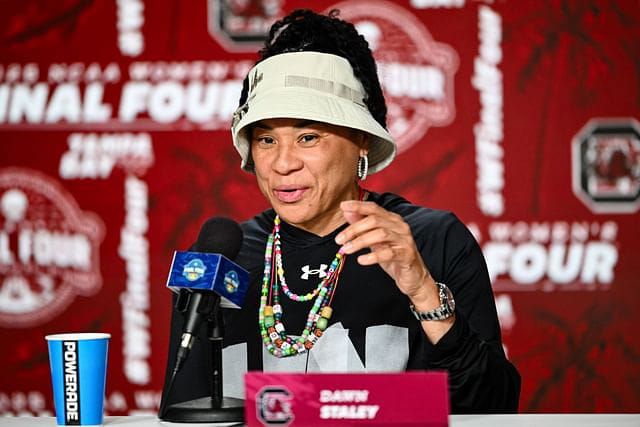Dawn Staley is a name synonymous with excellence in basketball. As a player, coach, and advocate for the sport, she has left an indelible mark on the game. Her accolades are numerous—Olympic gold medals, NCAA championships, Coach of the Year honors—yet when asked about her greatest achievement, she doesn’t hesitate. “Only one Hall of Fame meant everything to me,” she reveals, offering a rare glimpse into the personal significance behind her storied career.
For Staley, the Naismith Memorial Basketball Hall of Fame induction in 2013 stands above all other honors. It wasn’t just a recognition of her skill, leadership, or contributions to the game—it was a validation of her journey, a journey that began in the projects of North Philadelphia and ascended to the highest echelons of basketball immortality. “When you grow up where I did, you don’t dream of the Hall of Fame,” she admits. “You dream of survival, of making it out. The Hall of Fame wasn’t even a thought. So when it happened, it was like… this is for every kid who was told they wouldn’t be anything.”
Staley’s path to Springfield was anything but conventional. As a undersized point guard, she was overlooked by many recruiters, but her tenacity and basketball IQ set her apart. At the University of Virginia, she became a three-time National Player of the Year, leading the Cavaliers to three Final Fours. Yet, even then, she was often told she was “too small” or “not athletic enough” for the next level. She responded by becoming one of the greatest floor generals in women’s basketball history, earning six WNBA All-Star selections and three Olympic gold medals as a player.
But it wasn’t just her on-court brilliance that earned her a place in the Hall of Fame—it was her impact beyond the game. After retiring as a player, Staley transitioned seamlessly into coaching, first at Temple University and then at the University of South Carolina, where she built a dynasty. Under her leadership, the Gamecocks won national championships in 2017 and 2022, cementing her status as one of the best coaches in the sport. Yet, she measures success not just in trophies but in the lives she’s transformed. “I don’t coach for rings,” she says. “I coach to help young women see their worth, to give them the opportunities I didn’t always have.”
What makes Staley’s Hall of Fame induction so poignant is the weight it carries for those who came before her and those who will follow. She is acutely aware that her enshrinement wasn’t just about her—it was about the generations of Black women who paved the way and the young girls who now see themselves in her story. “When I walked into that Hall of Fame, I didn’t walk in alone,” she reflects. “I carried every coach who believed in me, every teammate who fought beside me, every player I’ve ever coached. And I carried my community—the people who raised me, who pushed me, who never let me quit.”
For Staley, the honor also serves as a reminder of how far the game has come—and how far it still has to go. She has been a vocal advocate for gender and racial equality in sports, using her platform to demand better treatment, resources, and visibility for women’s basketball. “The Hall of Fame is the ultimate recognition, but it doesn’t mean the work is done,” she says. “We have to keep pushing, keep opening doors, keep making sure the next generation doesn’t have to fight the same battles we did.”
When pressed on why this particular honor resonates so deeply, Staley pauses, then smiles. “Because it’s forever. Trophies collect dust. Records get broken. But the Hall of Fame? That’s immortality. That’s saying, ‘You mattered. You changed the game.’ And for a girl from the projects, that’s everything.”
Dawn Staley’s legacy is still being written. She continues to coach at an elite level, mentor future stars, and fight for equity in sports. But in that moment in 2013, when she stood on the stage in Springfield, she allowed herself to reflect—not just on her own journey, but on the countless lives she’s touched along the way. “Only one Hall of Fame meant everything to me,” she says. And in those words, we hear the heartbeat of a legend who never forgot where she came from—and who continues to lift others as she climbs.



